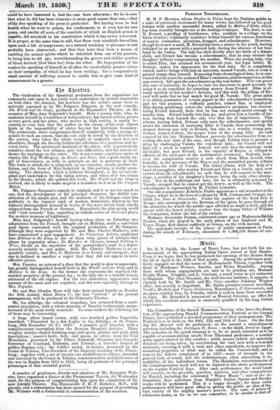PA.B.181AN THIUTBSCAL13.
M. M. P. Meurico, whose Fanfan la Tulips kept the Parisian public in a state of continual excitement for many weeks, has followed up his good fortune with another successful drama, called Le Maitre d'Eeole, which has been recently brought out at the Ambiga Comique. The hero, is one M. Evrard, a prodigy of benifleence, who, resident in a village on the Swiss frontier, voluntarily combines within himself the various functions of mayor, counsellor, physician, druggist, and schoolmaster. However, though he is now a saint, M. Evrard has been a sinner in his youth, having indulged in an amour with a married lady, during the absence of her hus- band in the Indies. The lady has died shortly after the birth of a female child, and Evrard has become a schoolmaster, that he may educate the daughter without compromising the mother. When the young lady, who is called Elise, has attained her seventeenth year, her legal father, M. Delmar, makes his appearance for the first time. He is completely ruined, and he brings with him an associate, named Varade, who is even a greater scamp than himself. Reasoning from chronological data, he is con- vinced that he is not the author of Elise's existence, andhis suspicions, in this case correct, fall upon the schoolmaster as the real father. If he can prove this case of paternity, he hopes to turn his discovery to good account, by using it as an expedient for extorting money from Evrard. Elise is al- ready entitled to her mother's fortune, and this with the pillage of Ev- rard will make her no bad match for good M. Varade. The great point is to obtain possession of certain papers in the schoolmaster's possession, and for this purpose, a ruffianly poacher, named Bax, is employed. This daring gentleman enters the schoolmaster's premises, but encoun- tering Evrard himself, finds that he has not enough moral courage to murder him. Evrard kindly lets him go, and gives him a bundle of let- ters, having first burned the only two that are of importance. This scheme having failed, Delmar calls upon the schoolmaster, and openly avows his intention of marrying Elise to Varade, thus occasioning the deepest distress not only to Evrard, but also to a worthy young gen- tleman, named Fabian, the proper lover of the young lady. An oath exacted by the late Madame Delmar prevents the schoolmaster from re- vealing the real state of the case, and, though Fabian tries to procure a delay by challenging Varade, the expedient fails ; for Varade will not fight till a week is expired. Indeed, not only does the marriage seem inevitable, but poor Evrard, in his capacity of Mayor, is obliged to officiate in the civil part of the matrimonial ceremony. Sudenly, how- ever, the conspirators receive a new cheek from Elise herself, who formally, in the presence of the Mayor and the assembled guests, refuses to become the wife of Varade. The foiled villain, with the help of a band of smugglers, who waylay Evrard and Elise on a lonely spot, now extorts from the schoolmaster an oath that he will consent to the mar- riage, a sacrifice of his daughter's honour being the only other alterna- tive. Nor do his sufferings end here, for he is ultimately poisoned by Varade, enraged that he cannot get the dowry, as well as the wife. The schoolmaster is represented by M. Fiedini Lemaitre.
Our old acquaintene.e Robert le Diable appears as a sad scoundrel at tho Cirque, where he is the hero of a drama by MM. Corman and Grange, en- titled Les Dues de _Normandie. Under the aupices of the fiend Eric le Rouge, who corresponds to the Bertram of the opera, he goes through all the atrocities for which the middle ages afforded so ample a field, and his amour with the famed Arlotta renders him the happy father of William. the Conqueror, before the fall of the curtain. Madame Alexandre Dumas, celebrated years ago as Mademoiselld.Ida Ferrier, when she played in the early pieces of her hnsband and M. Victor Hugo, died almost suddenly-at Genoa, on the 11th instant.
The aggregate receipts of the places of public amusement at Paris, during the month of February, amounted to 1,399,132 francs 35 cen- times.


































 Previous page
Previous page